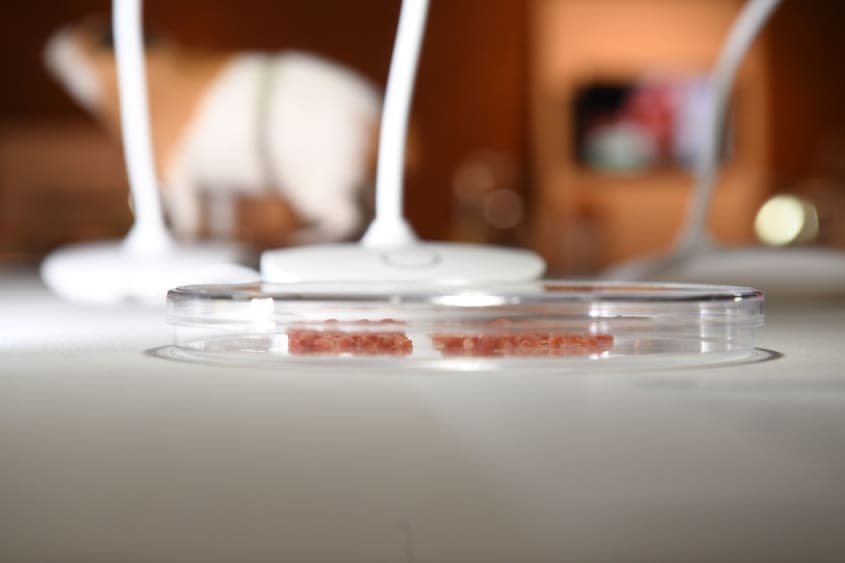Should labs try to create exotic animal meat?

Meat alternatives seem to be all the rage these days, with plant-based meats rising to the forefront. However, another option is also gaining traction: laboratory-produced meat. Until now, these products have mostly been replacements for conventional meats. Described by Bon Appétit as "beef grown from cow cells and pork grown from pig cells," unlike plant-based meats, lab-grown meats are actually made from the genetic building blocks of animals.
However, with the uptick of this trend, another offshoot of the meat industry has risen: exotic lab-based meats. An Australian company, Vow, recently unveiled a meatball made from a meat-producing gene of woolly mammoth DNA — yes, the same animal that has been extinct for 4,000 years. While this meatball was not edible, and was created only to market the possibilities of sustainable meat, the company is jumping ahead with the exotic trend, and has "already investigated the potential of more than 50 species, including alpaca, buffalo, crocodile, kangaroo, peacocks and different types of fish," The Guardian reports. The fish-cultivated meat is slated to be sold in Singapore later this year.
There is even an entire brand, Primeval Foods, that focuses exclusively on cultivating exotic meats, such as lions, tigers, and zebras," Fast Company reports. Another startup in Europe, Paleo, is similarly looking into alternatives for meat and fish through precision fermentation and lab growth.
However, it seems not everybody is on board with the idea of lab-based meats, especially when it comes to more exotic varieties of animals. The Italian government recently put forth a bill that "would ban laboratory-produced meat and other synthetic foods," BBC News notes, citing an effort to protect the country's longstanding culinary heritage.
What are commentators saying?
The answer might not be so simple, MacKenzie Graham argues for Slate, noting that "even if eating lab-grown meat—animal or otherwise—isn't, strictly speaking, immoral," there are environmental and cultural questions about the practice.
This brings about the most pressing issue of lab-based exotic meats: are they really necessary? "Do we really want to eat lion or tiger meat, and is it ethically acceptable to do so?" Lifestyle Asia asks, adding that there are conservation issues that could arise because the research on lab-based meats "concerns endangered species such as the tiger."
There are some who do not believe that lab-based meats are a sustainable solution, in reality. Many of these lab-based meat companies "have repeatedly missed product launch deadlines" because the research is simply not up to par, Joe Fassler writes for The Counter. David Humbird, a chemical engineer at UC Berkley, tells The Counter it was "hard to find an angle that wasn't a ludicrous dead end."
However, the founder of Primeval Foods, Yilmaz Bora, seems to feel otherwise, and tells Food Navigator that his company is currently working on recreating "Siberian tiger, leopard, black panther, Bengal tiger, white lion, lion, and zebra" in its labs.
Since no other animal has been domesticated since the agricultural revolution, the "trillion-dollar meat market is 'wide open' for startups who are willing to 'double-down on innovative ideas,'" Bora argues. The head of Primeval additionally tells The National that people eat beef and pork "not because they are the tastiest, healthiest or most nutritious species; they are just the easiest to domesticate. But now we can discover what is beyond domestication through technology."
What is next?
There is already some lab-grown conventional meat on the market internationally. Lab-grown chicken bites from a company called Eat Just were approved in Singapore in 2020, and are currently the only product of its type that can be purchased. Additionally, Shiok Meats has unveiled lab-created shrimp, lobster, and crab prototypes, and "plans to seek regulatory approval to sell its lab-grown shrimp by April 2023," Time reports.
However, even with these rollouts, it is unlikely that people will be eating lab-grown meat on a regular basis for a while, Time adds. The U.S. Food and Drug Administration said in November 2022 that a cultivated, lab-grown chicken breast made by UPSIDE Foods was safe to eat. The plan is to have it on grocery store shelves by 2028, executives told Reuters.
But it remains to be seen if anyone will be consuming lion or crocodile meat on a regular basis, even if lab-grown meats are finally creeping closer to becoming an everyday reality.
You may also like
A plant-filled home could help prevent infections, study finds

